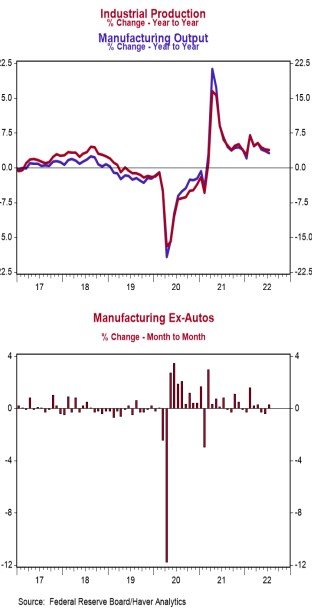- Industrial production increased 0.6% in July (+0.4% including revisions to prior months), beating the consensus expected gain of 0.3%. Utilities output fell 0.7% in July, while mining increased 0.7%.
- Manufacturing, which excludes mining/utilities, increased 0.7% in July (+0.8% including revisions to prior months). Auto production rose 6.7%, while non-auto manufacturing increased 0.3%. Auto production is up 13.2% in the past year, while non-auto manufacturing is up 2.5%.
- The production of high-tech equipment increased 0.4% in July and is up 8.9% versus a year ago.
- Overall capacity utilization rose to 80.3% in July from 79.9% in June. Manufacturing capacity utilization increased to 79.8% in July from 79.3%.
Implications:
Activity in the US industrial sector rose more than expected in July following a brief moderation over prior months, hitting a new record high and signaling that the US economy is not yet in a recession. Looking at the details, the biggest source of strength in today’s report came from the manufacturing sector, with both auto and non-auto manufacturing contributing to July’s gain of 0.7%. The strength in manufacturing was also somewhat surprising given the recent trend of Americans shifting their consumption preferences back toward services and away from goods. For example, the ISM Manufacturing index recently saw the new orders index fall into contraction territory. On top of this, yesterday’s release of the Empire State Index, a measure of New York factory sentiment, plunged unexpectedly to -31.3 in August from +11.1 in July largely due to weakening orders and shipments as well. Conversely, the New York Fed report on the services sector for August showed 6-month forward looking expectations of business activity expanding, rising to +12.6 from 0 in July. The mining sector (think oil rigs) continued to expand as well in July, rising 0.7%, though the index remains below pre-pandemic levels. We expect continued gains from this sector in the months ahead with oil prices currently still hovering around $90 a barrel incentivizing new exploration. Unfortunately, there is still no sign of the federal government lending a hand on the energy front, even with the political kryptonite of inflation raging. For example, the recently passed Inflation Reduction Act continues to prioritize green-energy investment, though potential reforms to permitting and the environmental review process for large energy infrastructure projects are being discussed. The good news is that capacity continues to come back online despite this, with Baker Hughes reporting that the total number of oil and gas rigs in operation in the US is rapidly approaching pre-pandemic levels. Finally, the utilities sector, which is volatile from month to month and largely dependent on weather, was the only source of weakness in today’s report, falling 0.7%. Overall, despite the shift back toward services, we expect continued modest gains in industrial production in 2022 as demand continues to outstrip supply. For example, this report puts industrial production 3% above pre-pandemic levels. Meanwhile, tomorrow’s report on retail sales should show that after adjusting for inflation, “real” retail sales are up around 16.5% over the same period. This mismatch between supply and stimulus-boosted demand shows why inflation remains uncomfortably high.





